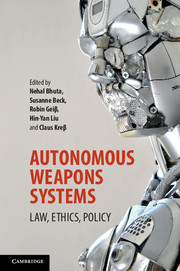Book contents
- Frontmatter
- Contents
- List of contributors
- Acknowledgements
- PART I Introduction
- PART II Meanings of autonomy and human cognition under automation
- PART III Autonomous weapons systems and human dignity
- PART IV Risk, transparency and legal compliance in the regulation of autonomous weapons systems
- PART V New frameworks for collective responsibility
- PART VI New frameworks for individual responsibility
- PART VII Conclusion
- 15 Present futures: concluding reflections and open questions on autonomous weapons systems
- Index
15 - Present futures: concluding reflections and open questions on autonomous weapons systems
from PART VII - Conclusion
Published online by Cambridge University Press: 05 August 2016
- Frontmatter
- Contents
- List of contributors
- Acknowledgements
- PART I Introduction
- PART II Meanings of autonomy and human cognition under automation
- PART III Autonomous weapons systems and human dignity
- PART IV Risk, transparency and legal compliance in the regulation of autonomous weapons systems
- PART V New frameworks for collective responsibility
- PART VI New frameworks for individual responsibility
- PART VII Conclusion
- 15 Present futures: concluding reflections and open questions on autonomous weapons systems
- Index
Summary
Introduction: surveying the arguments
The chapters collected in this volume address an as-yet unrealized future potentiality: something called an ‘autonomous weapons system’ (AWS), the definition of which remains open to vigorous contestation. To debate an uncertain future is necessarily to represent it, to sketch and engage with competing visions of it and, in a very practical sense, to try to shape it through our contemporary reflections. As historian of science Jenny Andersson observes about the emergence of ‘futurology’ in the 1960s, predicting and contesting the contours of possible future realities (neologized as ‘futuribles’ by French intellectual Bertrand de Jouvenel) was a kind of ‘world-making … a veritable battlefield of competing images of the future of the world’. In such an exercise, the lines between forecasting, prediction, speculation, envisioning, and even science fiction are blurred. The point of such conjecturing – no matter how fanciful – is to influence action and thought in the present by making some future states of the world seem desirable or undesirable, inspiring or terrifying, comforting or anxiety producing:
Speculation, predictions, and especially visions, have rhetorical power; they can be used as a form of persuasion, to enroll others into activities that help make a particular future a reality. They can also be used to lay the groundwork making us comfortable with a situation that might occur in the future. Visions can be dangerous as well, insofar as they draw attention away from other possibilities and other possible agendas for research and development.
To contest the future is necessarily to contest the present. One might add a corollary relevant to AWS: to contest the future of machines is to always contest the future of the human and how we understand what – if anything – is necessarily and distinctively human about a given field of activity. In her Reflections on Violence, Hannah Arendt seeks to distinguish between violence and power in order to capture a dimension that she considers to be specifically human: violence is instrumental – a means to an end – and those means could well be enhanced by technological progress. However, violence in and of itself is in the service of something human: power, force and strength.
- Type
- Chapter
- Information
- Autonomous Weapons SystemsLaw, Ethics, Policy, pp. 347 - 383Publisher: Cambridge University PressPrint publication year: 2016
- 3
- Cited by



